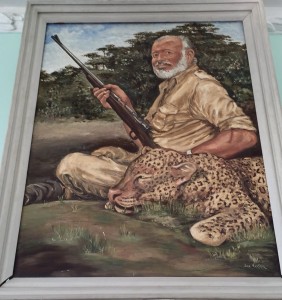 Update: Now that I’m back home from Cuba with better Internet access, I’ve added pix of Hemingway’s house.
Update: Now that I’m back home from Cuba with better Internet access, I’ve added pix of Hemingway’s house.
***
I’m writing today’s post from the Hotel Nacional in Havana, Cuba, fervently hoping that the revolutionary Internet watch dogs (perros de la seguridad) will allow my words to be successfully uploaded to WordPress and displayed beyond there to you, Dear Reader, on Tuesday. We’re on the third day of an eight-day excursion to this island nation. (In terms of encountering Internet censoring, so far I haven’t in fact encountered too many problems. The only sites that have been completely blocked so far are the Huffington Post and Gawker. Amazon did seem a tad confused when I tried to order a Kindle book online from my Cuban hotel room–first it displayed a message saying that Kindle books aren’t available in the United States; then it asked whether I’d recently changed my country of residence. I ultimately gave up my quest to purchase the e-book).
It’s interesting visiting Cuba immediately in the wake of the lifting of the decades-long trade embargo and Obama’s recent presidential visit.
I think many Americans are assuming, as I did, that once the embargo is finally lifted in practice, Cuba will be quickly transformed into a more-or-less Westernized economy. I no longer think that’s the case. Cuba is…well, it’s different. As one of my fellow American travelers said with a sigh, over a highly restricted menu at a government-owned restaurant, “Cuba has a long way to go.” First, there’s the abysmal infrastructure (Example: all human waste is dumped directly into the harbor because there are no treatment plants). Then, there’s the highly centralized economy. (This morning we learned from a speaker that there’s no such thing as a wholesale business in Cuba. Everyone pays the same exact price everywhere. Try to make a profit running a business that way).
On the plus side, the country of Cuba is charming in many ways. Being here is literally like stepping into a time warp. Taxis are mostly 50-era Chevys (we even saw one Edsel taxi); many streets are cobblestone; architectural styles are similarly retro. The adult literacy rate is nearly 100%.
Overall as an American, though, I feel slightly uncomfortable in Cuba. It started in the airport when our group waited two hours for our baggage to be offloaded from our American Airlines charter flight. (It was Saturday night; it turns out that people don’t like working on Saturday nights). Being in Cuba makes me aware that Americans are impatient. Pushy, even. We tend to look at something and try to figure out a way to make it work faster, better. I think that once Cuba is overrun with Americans telling them how to make things work faster and better, they may want to pack us all off on the next one-way barco to Miami. And I wouldn’t blame them a bit.
See you back in the States–and viva Cuba Libre!
Update: Now that I’m back home with better Internet access, I’ll post pix of Hemingway’s house in Cuba. I was happy to be able to see the famous typewriter where, standing on top of a Lesser Kudu gazelle skin, he every morning. I had to shoot through a window because visitors aren’t allowed inside, but I successfully bribed a docent to take the closeups of the typewriter and the gazelle hide. (There’s an upstairs office that one of Hemingway’s wives commissioned as a writing office, but our guide said Hemingway used it mostly for rendezvous with one of his lovers. He did his actual writing at the typewriter by his bed).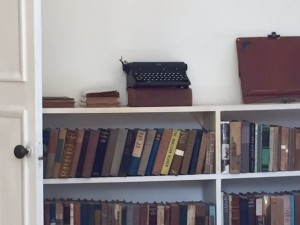



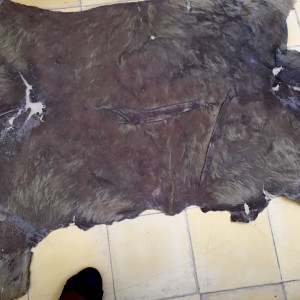
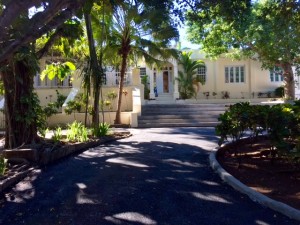
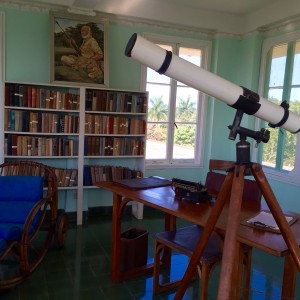

Morning and thanks for that eye-opening article! I have been looking at a 10-day photography trip to Cuba. And as much as I want to experience life in Cuba before commercialism, I don’t want to rough it either. Mostly though, the limited government run restaurant bothers me, or maybe scares me, the most! Call me a spoiled foodie American. Oh and how was the hotel? I’m assuming you didn’t have *coughs, turn down services?
Maureen, it’s been interesting. The hotel is lovely, if a bit musty-smelling. Unfortunately this morning, two of our group got sent to the hospital–one from a severe gastric ailment, the other because he fell down a roadside ravine and fractured something in his leg while trying to hail a passing car to transport the first ailing gentleman back to Havana. (!) I would love to upload some pictures of things we’ve encountered during the stay, but alas the local bandwidth capacity precludes digital uploads for the moment. Stay tuned!
I lived in Cuba (La Habana, two blocks from the Capitolio) for a year in 2001 (I’m a Canadian) and sent regular emails to all my friends about my experiences there. When I returned, people asked me when my book was coming out. What book? My book about Cuba.
I haven’t written it so don’t worry… this is not a plug.
But speaking of food. Other than the fact that many Cubans thought I was the Bank of Canada, food was my biggest challenge. Food in the all-inclusive resorts was wonderful (except for cakes, etc…. they used lard instead of butter), with lots of variety. And there’s a narrow street in Habana Vieja with a variety of restaurants (e.g., a Chinese restaurant) and with commensurately high prices, but otherwise the selection was abysmal.
The white bread was fluff and I’m sure causes cancer or some other fatal disease. The other bread? What other bread? I spent months looking for whole wheat to make my own bread, and finally bought it on the black market.
For the first three months, I lived entirely without eggs. None available in Greater Havana, even on the black market.
Spices and herbs? None fresh, and only four available: salt, pepper, cumin, and cinnamon. I kept on asking where the diplomats shopped, and trekked out to Mercado 23, only to find a bigger market with even more rows of mayonaise, tuna and olives, but I did see oranges (!!! but horribly dry.)
The Cuban markets’ selection: rice and beans (but you had to take them home and spread them out on the kitchen table so you could remove twigs and pebbles, etc.), cabbage, a small pepper (only saw one red bell pepper the whole time I was there), horrible powdered milk (at $3 a kilo), chicken, and rarely any letttuce. Once I found watercress, the same day I found the red pepper, and immediately grabbed it.
In the Mercados en Divisa (US dollars needed, but it was illegal for Cubans to own US dollars at the time), the selection wasn’t much better, but the prices were gawdawful: cornflakes (from Canada) at $11 USD a small box, raisin bran at $15 a box, a small tetrapack of milk at $5.50, passable powdered milk at $5 a kilo, plain cheeses at prices even I didn’t want to pay.
To put these prices into perspective, the average monthly wage at the time was $11 USD. One of my friends was the Chief Medical Officer for the problem of AIDS in Greater Havana. His salary? $25 USD a month. Helpers in resorts made $35 USD a month. No wonder so many Cubans spend time in jail, because they must do many things illegally to survive (things that would be legal in many other countries.)
As for literacy rates at almost 100%? I believe that has changed (long story), and, like many Latinos, when writing, they confuse the “b” with the “v”, the “g” with the “j”, and left off the silent “h” and the “s”, i.e., they often spell phonetically.
I could go on, even about food, but maybe I will write that book some day. Or, since short books seem to generate more revenue, I might do one about food, one about sexual mores and male/female relationships, another one about prostitution, one about music and dancing, one about how to run a private B&B (almost not worth the effort), fashion, health care and medicines, dental care, transportation, my friendship with the Communist party representative on my block, water, massive depression and its signs in the Cuban people, and how I’m probably on the CSIS list as a subversive because I joined a woman’s group there… yadda, yadda, yadda.
But I will say one more thing. Whether a country’s government is repressive or not, you cannot understand a country as a tourist or visitor. You must live there as much like a native as possible.
Sheryl, we visited a seminary where an older gentleman was carefully cleaning rice by separating it from tiny rocks and who knows what else. So much work required to make a simple dish! Thanks for visiting!
“I think that once Cuba is overrun with Americans telling them how to make things work faster and better, they may want to pack us all off on the next one-way barco to Miami. And I wouldn’t blame them a bit.”
It’s a cultural thing though. When immigrants come here and work harder and cheaper, we don’t like losing our jobs. So let’s send them all back for ruining our way of life or changing the economic culture in America.
Same difference. One country’s people (en mass) can influence the economy and the culture.
It won’t be a bad experience because it will be a learning experience. I hear in your tone that you’ve learned so much already. That’s the point of going now. You don’t have too many opportunities to experience a communist country anymore and see how flawed the system was. And then you reflect on all the years (decades?) Americans feared that Communism would try to overtake us. Wow. What were we thinking?
Cuba is such an anachronism, even in the Communist world. To be fair to them, the average Cuban has a dramatically longer lifespan, better education, and far better health care than he or she did before 1960. But the system is obviously no longer working, so they’re looking for new solutions.
Sorry. It’s not our fault that the Cubans are in the mess they’re in.
I feel absolutely no need to feel remorseful about their situation, nor do I see a need to be uncomfortable. I think maybe the so-called American remorse belongs only in the liberal minds of American people who refuse to rejoice in America and Americanism, despite all our faults and problems.
Enjoy yourself. Please feel no need to try to make me join you in your feelings.
Non-discomfort duly noted, Jim! ?
I’m envious of your trip but can hardly complain as I just got back from a week in Nicaragua:) I always think an outsider’s perspective on a country is fascinating so I’m hoping one day you’ll incorporate your experiences into a book!
If you get to see the Hemingway house, please give us a review!
Hi Mike, I just updated the post with photos of his house. I loved seeing the famous typewriter at which he wrote each morning, standing on a Kudu gazelle skin!